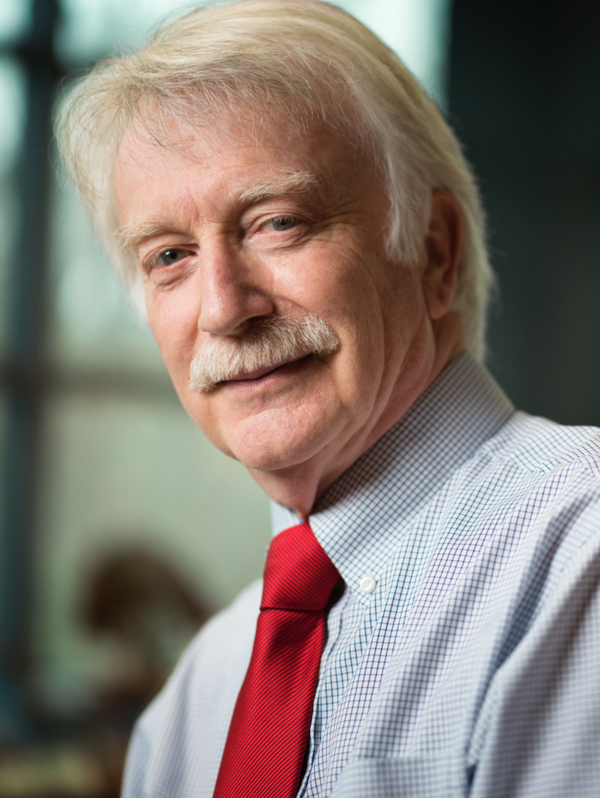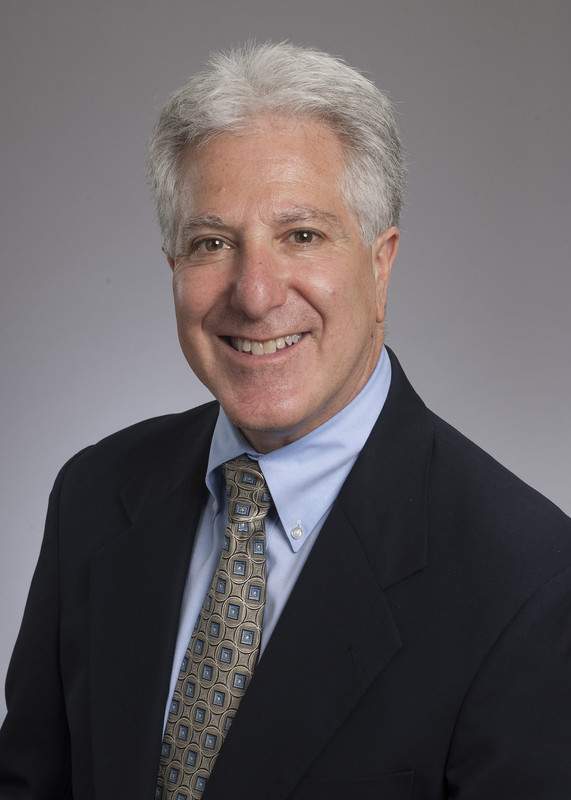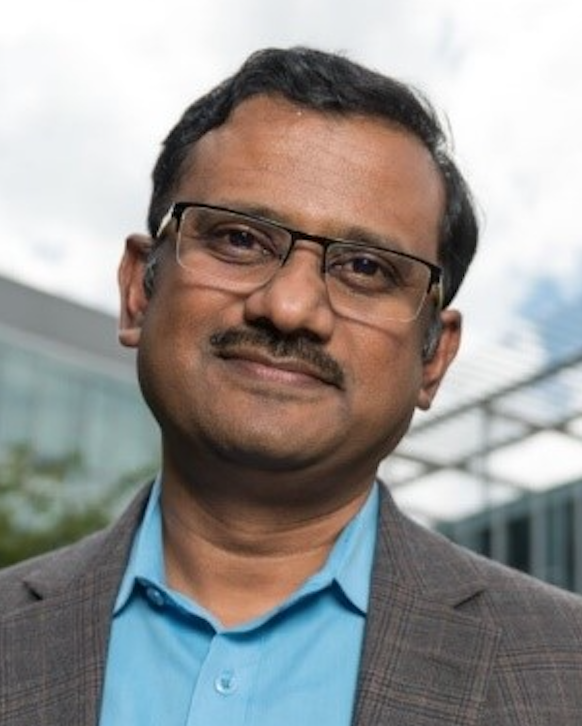Leaders of the research enterprise
GRA’s Senior Fellows are seasoned scientists leading large, multidisciplinary research centers. These centers are engines of discovery; they elevate Georgia’s profile and national competitiveness as a true pioneer of scientific exploration.
Alan Darvill, Ph.D.
Director and Regents Professor
Complex Carbohydrate Research Center
University of Georgia
Alan Darvill is Regents Professor of biochemistry and molecular biology and director of the Complex Carbohydrate Research Center, which he founded with Peter Albersheim in 1985. He is also principal investigator of the Department of Energy (DOE)-funded Center for Plant and Microbial Complex Carbohydrates.
Darvill’s research focuses on the structure and function of the non-cellulosic polysaccharides of plant primary cell walls, and he has published over 200 refereed research papers.
Darvill was elected Fellow of the American Association for the Advancement of Science in 2010 and was the recipient of the Lothar Tresp Outstanding Honors Professor award in 2012 and the Blue Key Service award in 2018. In addition, he served as chairman in 1994-95 of the Carbohydrate Division of the American Chemical Society and was appointed a member in 1993 and chairman in 1996 of the Martin Gibbs Medal Committee of the American Society of Plant Physiologists.
He has served on the editorial boards of Glycobiology and of the Plant Journal for Cell and Molecular Biology and was an editor of the textbook “Essentials of Glycobiology” (3rd edition, 2017). Darvill received the Outstanding Faculty Award of the UGA Chapter of the Golden Key National Honor Society in 1995.
Darvill received his B.S. in plant biology in 1973 from Wolverhampton University (England) and his Ph.D. in plant physiology in 1976 from the Aberystwyth University (Wales).
Interview with Alan Darvill >
Visit Alan’s page at UGA's website >
Allan Levey, M.D., Ph.D.
Director, Goizueta Alzheimer's Disease Research Center
Director, Goizueta Institute
Emory University
Allan Levey is a professor of Neurology at Emory University's School of Medicine, as well as the director of Emory's Goizueta Alzheimer's Disease Research Center and new Goizueta Institute. He served as chair of the Department of Neurology from 2003 to 2021.
Levey is an internationally recognized expert in neurodegenerative disorders. His work has contributed to understanding the brain systems and mechanisms involved in disorders such as Alzheimer's and Parkinson's diseases. He leads multi-disciplinary national and international research teams as part of the NIH Accelerating Medicine Partnership for Alzheimer’s Disease (AMP-AD) and TREAT-AD to discover and validate novel therapeutic targets, target enablement for early-stage drug discovery and next-generation biomarkers.
He has more than 400 research publications and has won several awards, including the Derek Denny-Brown Neurological Scholar Award from the American Neurological Association, the Heikkila Research Scholar Award from the National Parkinson Foundation, the Health Advancement Research Award from Community Health Charities and the Team Hope Award for Medical Leadership from the Huntington's Disease Society of America. In addition, he is a member of the Johns Hopkins Society of Scholars and the National Academy of Medicine.
Visit Allan's page at Emory's website >
Paul Johnson, M.D.
Director
Emory National Primate Research Center
Paul Johnson, MD, is director of the Emory National Primate Research Center. Prior to joining the center in 2014, he served as director of the New England Primate Research Center (NEPRC), chairman of the NEPRC Division of Immunology and professor of medicine at Harvard Medical School and Massachusetts General Hospital.
Among Johnson’s research interests is identification of immune responses that can protect against HIV infection. “Analyzing protective immunity in macaques immunized with SIV is one of the best models we have to try to design better AIDS vaccines,” he says. “The focus of my work is determining what sort of immune responses can best protect people against HIV.”
In addition to his research and serving as director of the NEPRC, Johnson has held various leadership roles at Harvard Medical School, including director of the Developmental Research Core for the Harvard Center for AIDS Research and associate director of the Harvard Committee on Microbiologic Safety. He has served as a highly regarded mentor for numerous post-doctoral fellows and graduate students and has taught medical students, residents and fellows within the clinical service of Massachusetts General Hospital and for the Harvard Medical School Virology and Immunology Programs.
Visit the Emory NPRC website >
Suresh Ramalingam, M.D.
Executive Director
Winship Cancer Institute
Emory University
Board certified in medical oncology, Suresh S. Ramalingam is nationally recognized as a researcher and physician in the area of small cell and non-small cell lung cancer.
Ramalingam serves as executive director of Winship Cancer Institute of Emory University and associate vice president for cancer of Emory’s Woodruff Health Sciences Center. He is past president of the Georgia Society of Oncology and a member of the board of Georgia CORE. He is also a fellow of the American Society of Clinical Oncology and a Georgia Cancer Coalition Distinguished Cancer Scholar.
Ramalingam holds professional memberships with the American Society of Clinical Oncology, American Association for Cancer Research and International Association of Lung Cancer Study. He plays an active role in the ECOG-ACRIN Cancer Research Group as the deputy chair of the Therapeutics Studies Program and as former chair of the Thoracic Malignancies Committee. He serves on several international, national and institutional committees and is a former member of the Medical Oncology Board Exam Committee for the American Board of Internal Medicine. He serves as a principal investigator for the Emory University lung cancer SPORE award from the National Cancer Institute.
Ramalingam is a graduate of Kilpauk Medical College at the University of Madras in Madras, India. He completed his residency in internal medicine at Wayne State University in Detroit, Michigan and his fellowship in hematology and medical oncology at the University of Pittsburgh Cancer Institute in Pittsburgh, Pennsylvania.
Ramalingam's research involves developing immune checkpoint inhibitors and improving outcomes for patients with EGFR mutations. He has conducted numerous phase 1, 2 and 3 clinical trials with molecularly targeted agents in the treatment of small cell and non-small cell lung cancer.
Visit Ram’s page on Emory’s website >
Krishnendu Roy, Ph.D.
Director, NSF Engineering Research Center (ERC) for Cell Manufacturing Technologies (CMaT)
Georgia Institute of Technology
Krishnendu (Krish) Roy holds several appointments at Georgia Tech: Robert A. Milton Chair Professor at the Wallace H. Coulter Department of Biomedical Engineering, director of the NSF Engineering Research Center (ERC) for Cell Manufacturing Technologies (CMaT); director of the Marcus Center for Cell-Therapy Characterization and Manufacturing (MC3M); and director of the Center for ImmunoEngineering.
Roy received his undergraduate degree from the Indian Institute of Technology (India) followed by his M.S. in biomedical engineering from Boston University and his Ph.D. in biomedical engineering from Johns Hopkins University. After completing his Ph.D., he joined Zycos Inc., a start-up biotechnology company where he served first as a scientist and then as a senior scientist in the Drug Delivery Research group.
Roy left industry to join The University of Texas at Austin in 2002, where he was professor and Fellow of the Cockrell Chair in Engineering Excellence. He left UT-Austin in July of 2013 to move to Georgia Tech.
Roy’s research interests are in the areas of immunoengineering, cell manufacturing, controlled drug and vaccine delivery technologies and stem cell engineering. His work is at the interface of biomaterials and the immune system, with applications in cancer, infectious diseases and immunotherapies. In recognition of his seminal contribution to these fields, Roy has been elected Fellow of the American Institute for Medical and Biological Engineering (AIMBE) and Fellow of the Biomedical Engineering Society (BMES).
Roy’s research has been supported through numerous grants from the NIH and NSF and several foundations. He serves as a member of the editorial boards of the Journal of Controlled Release, the European Journal of Pharmaceutics and Biopharmaceutics and the Journal of Immunology and Regenerative Medicine, all from Elsevier; and the AIChE Journal of Advanced Biomanufacturing and Bioprocessing. He is a member of the Forum on Regenerative Medicine of the National Academies of Science, Engineering and Medicine (NASEM), and a board member of the Standards Coordinating Body (SCB) for Cell and Regenerative Therapies.
Visit Krish Roy's page on Georgia Tech’s website >





